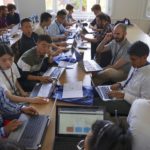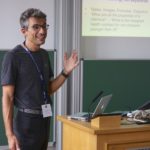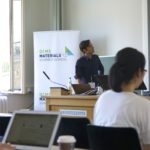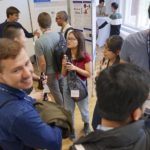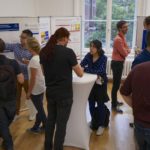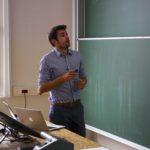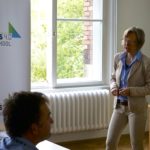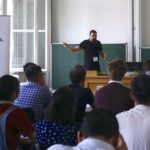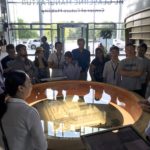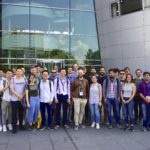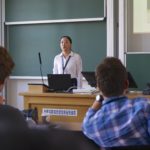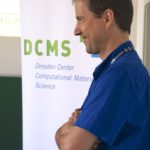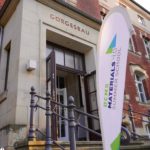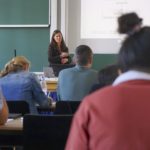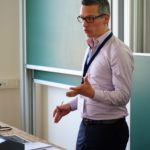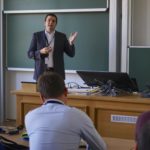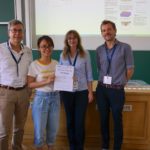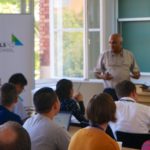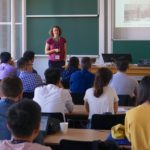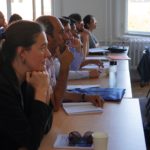DAY ONE
This first day of the Summer School Materials 4.0 – Deep Mechanics started with the Welcome and Opening ceremony. On behalf of the organization team, Prof. Gianaurelio Cuniberti, Prof. Sybille Gemming and Prof. Markus Kästner gave a warm welcome to all the participants and speakers. They introduced the ideas of DCMS and the concept of the upcoming five days of the Summer School.
The first lecture was given by Dr. Federico Zipoli (IBM Zurich, Switzerland). He presented a creative way to extract information from different unstructured sources with the aim of creating a platform allowing researchers to efficiently retrieve and link facts. In particular, he introduced the work on building a platform being capable of connecting data from different sources like publications allowing inference and analytics to drive the discovery of novel materials and materials applications.
In the afternoon, Dr. Thomas Lehmann (TU Dresden) gave an overview on some of the available machine learning tools in Python. Using a Jupyter notebook, the participants could directly try out the respective methods and concepts. The hands-on session in the afternoon gave a perfect opportunity for further discussions and to explore the capabilities offered by Python.
In the evening, the participants had some time to get to know each other on the ice breaking event and discussed their research interests, hobbies and everything else over pizza and beverages.
DAY TWO
On the second day of the Summer School, Prof. Stefanie Reese (RWTH Aachen University, Germany) gave a lecture on model reduction and data-driven mechanics. In her work, she aims at using data directly from experiments to do predictive and reliable computations without explicit materials models.
In the second lecture, Prof. Patrick Rinke (Aalto University, Finland) gave an overview on machine learning in materials science. He firstly introduced the basic workflow governing most machine learning approaches in material science. Later, he showed how materials are presented to the machine for optimal learning. He also introduced the kernel ridge regression approach and artificial neural networks.
Frank Grossmann and Dr. Holger Grossmann (SAP and Anton Paar GmbH, Germany) gave a lecture on the prospect of blockchain solutions for Materials 4.0. They gave a basic introduction to the blockchain technology and highlighted current application examples, which can be linked in direct or indirect relation to materials.
Emre Topal (Fraunhofer IKTS, Germany) introduced neuronal networks for the improved reconstruction of X-ray CT data. In particular, he demonstrated some modern machine learning approaches for applications of deep convolutional neural networks (CNNs) to high-resolution X-ray computed tomography, transmission electron microscopy and cryo-electron microscopy data for artefact reduction, noise reduction and pattern recognition.
The day was concluded by a visit to the Dresden Center for Nanoanalysis (DCN) at TU Dresden and a preview on the upcoming art exhibition “Lighter than air” at the Altana Gallery which hosted this year’s Summer School.
DAY THREE
The third day started with Dr. Daniel Urban (Fraunhofer IWM, Germany). His topic was the challenges related to creating a materials database for the digital representation and modelling of materials along the life cycle of products. He discussed the requirements and the technical structure of such data bases as well as the necessary steps for the digital workflow.
Then, Ms. Weihui Xie (Shanghai Jiao Tong University, China) gave a short presentation introducing the “Zhi-Hong” International Summer School of Advanced Materials (ISS-AM) as well as School of Materials Science and Engineering (SMSE) at Jiao Tong University. In July 2020, the 4th “Zhi-Hong” ISS-AM will be jointly organized with DCMS Summer School.
The program in the afternoon included an excursion to Dresden’s VW Gläserne Manufaktur as well as a cultural visit to the Dresden City Centre.
DAY FOUR
The fourth day began with Prof. Benjamin Klusemann (Leuphana Universität Lüneburg and Helmholtz Center Geesthacht, Germany). In his talk, he presented applications of machine learning approaches in the context of processes and materials with a special focus on artificial neural networks. In particular, he discussed several successful applications of machine learning approaches to specific problems in the field of continuum materials mechanics.
The second lecture was given by Dr. Rebecca Janisch (ICAMS, Ruhr-Universität Bochum, Germany). She introduced atomistic aspects of deformation and fracture and showed different methods to simulate mechanical deformation on the atomic scale and to extract mechanical properties of micro- and macro-structures.
The third lecture was given by Prof. Marc–André Keip (Universität Stuttgart, Germany) on the use of machine learning methods in multiscale modeling. He provided a short overview on potential applications of machine learning in computational mechanics. After that, Felix Göküzüm (Universität Stuttgart, Germany) gave a hands-on session with space for discussions and to explore the potentials offered by machine learning tools.
The day was concluded by a contributed talk session where three participants showed and discussed their current research results.
DAY FIVE
The fifth day started with a lecture on non-destructive testing of materials and composites given by Dr. Anja Waske (Bundesanstalt für Materialforschung und -prüfung (BAM), Germany). She demonstrated how X-ray tomographic (XCT) investigations can contribute to structure investigations in composites and massive samples, highlighting the example of magnetic materials for energy conversion.
Dr. Amber Geurts (Aalto University, Finland) gave the second lecture of the final day, speaking about the emergence of data-driven materials research as a field of science and business. She presented the historical development and the current status of this field, from early adoptions of open science to the rapid expansion of materials data discovery platforms under the current AI hype.
The lecture session of the Summer School was concluded by the inspiring keynote presentation of Prof. Surya R. Kalidindi (Georgia Institute of Technology, Atlanta, USA) on materials innovation driven by data and knowledge systems.
The DCMS summer school was wrapped up in a round table with participants. We got a lot of immediate and positive feedback from the participants which will help us to get even better the next time. Finally, we awarded the best and most popular posters and rewarded the winners with book prizes. Congratulations to the awardees and thanks to all others for preparing such great posters which gave us a hard time evaluating and ranking them!
We would like to thank all the lecturers, speakers and participants for an interesting and successful week devoted to this amazing Summer School! We hope that everyone involved enjoyed the School as much a we did and we are looking forward to the next edition of Materials 4.0 in 2020! Stay tuned for the first announcement to be published soon!




